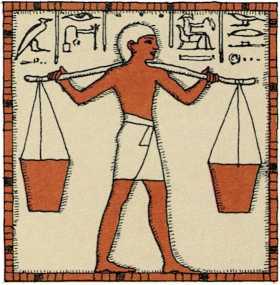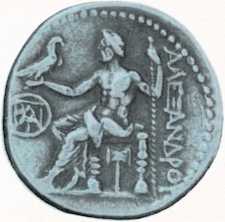Balances and coins
When people first began to raise crops, they had to carry the grain from
the field to a storage place. They soon learned that they could carry
two loads easily by hanging one load at each end of a pole carried
across their shoulders. If the loads were about equal, the pole would
balance. This gave people the idea for the kind of scale called a
balance, for weighing things.


Probably the first thing that people weighed was gold. About six
thousand years ago, the ancient Egyptians used weights made of cut and
polished stones. Later, they made fancy bronze weights in the form of
oxen and ducks.

An ancient Greek coin, called a stater, shows the head of Alexander the
Great joined with the head of a lion. The name stater means “weight.”
One reason the Egyptians weighed gold was to keep people from cheating.
Only the pharaoh and a few great nobles could own gold. When the pharaoh
wanted to have a ring or necklace made, gold was taken from the royal
treasury and given to the goldsmiths.
But there was always a risk. The goldsmiths might try to keep a little
of the gold instead of using it all. So, before the gold was given to
the goldsmiths, it was always weighed in a balance.

A Greek drachma, made about 2,300 years ago, shows the god Zeus with an
eagle and bears the name of Alexander. Drachma means “handful.”
The gold was put into one of the pans of the balance. One or more small
weights, shaped like animals, were then put into the other pan until the
weights and the gold balanced. And, after the ornament was made, it was
weighed—to make sure that the goldsmiths hadn’t kept any of the gold.
After a while, someone came up with the idea of making small pieces of
gold or silver that were marked to show their weight. And these weights
were the beginning of money—the first coins. That is why some money
names were originally the names for units of weight.

The Hebrew letters on this silver shekel show that it was made in Judea
more than 1,900 years ago. A shekel was also a unit of weight.
The shekel was a unit of weight in Babylonia. It was also the name of an
ancient Hebrew silver coin. Today, “shekels” is slang for money. The
money unit in Greece is the drachma, and it was originally a unit of
weight. The name drachma means “handful.” In Great Britain, the basic
unit of money is the pound. It got this name because at one time it was
worth the number of pennies made from a pound of silver.
